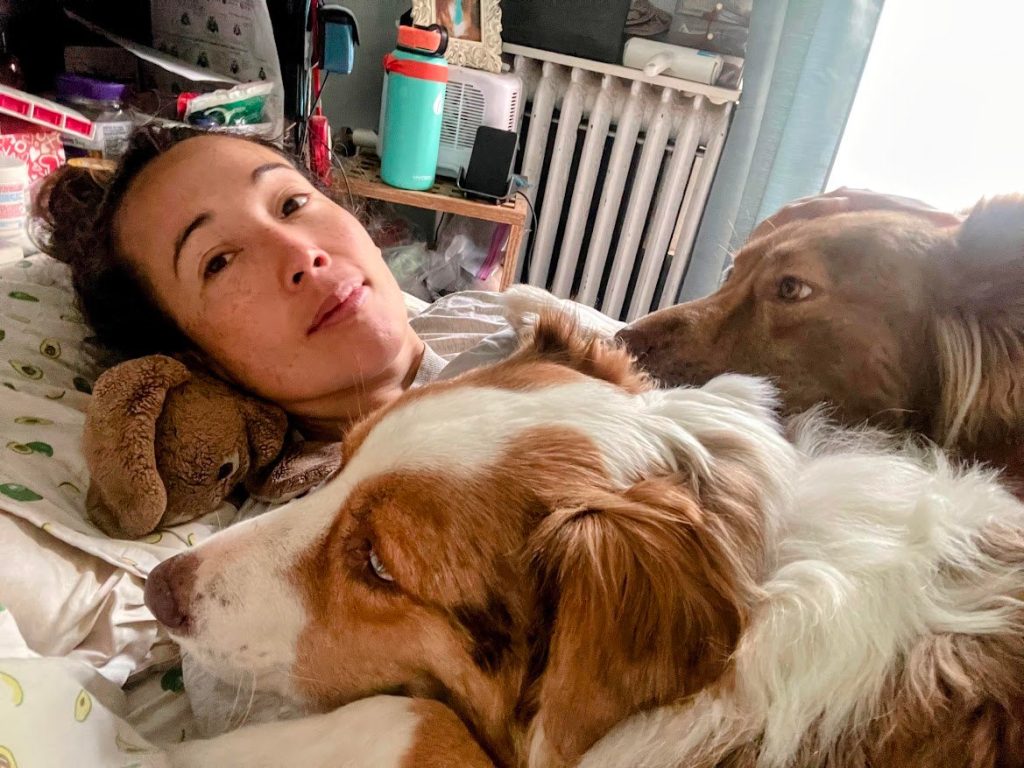Blog
For five years, doctors told Stephanie there was nothing wrong with her. Her bloodwork was inconclusive. In her hospital records, doctors dismissed her as “psychosomatic.” But her pain and fatigue kept getting worse. At one point, she was bed-bound for seven months until one doctor, assuming her symptoms were auto-immune related, finally started her on prednisone.
The prednisone kept things at bay, but the disease was still active. For four years, Stephanie was on high doses of the steroid medication and continued to have serious and debilitating symptoms.
Then everything escalated. Stephanie was gripped by new, intense symptoms. Her lungs felt like they were under attack; she was struggling to breathe even while laying in bed. The breathlessness made it hard to talk, eat, or sit up. She felt like she was dying.
Desperate, she sought out a second opinion at the U of M Fairview in Minneapolis. That’s when she met Parastoo Fazeli, MD, who would change the trajectory of her journey. Dr. Fazeli, a member of the Minnesota Multidisciplinary Vasculitis Program at Fairview/University of Minnesota Department of Medicine, really listened to Stephanie.
While Dr. Fazeli was unable to find a unifying diagnosis, she kept Stephanie under close watch. When her feet swelled up so severely she couldn’t walk, Dr. Fazeli took her seriously and eventually admitted her to the hospital for a battery of tests.
As the pain amplified to the point that Stephanie needed morphine, the hospital brought in different teams to try to solve her medical mystery. They asked Stephanie if there was anything they might be missing, any other symptoms she had noticed? Stephanie had just been on a trip to northern Minnesota. During it, she noticed tiny pin pricks on her feet; she assumed they were harmless bug bites. But the rheumatology team took a biopsy. She had small-vessel vasculitis affecting the skin.
Still, she was getting pushback and denials from doctors who didn’t believe her. The hospital neurologist, who saw in Stephanie’s old records that her condition was “psychosomatic,” didn’t want to see her and refused to do an EMG on the nerves in her feet. “It was heartless,” Stephanie said. “I was in the worst pain of my life. I was in tears. He dismissed me and acted like I was faking it.” The neurologist’s callous response made her feel even more alone. “It broke my heart to be treated so dismissively. It was earth-shattering. I was already struggling to deal with all the changes, all the things I couldn’t do that I did before.”
After a week, Stephanie went home, once again on high dose prednisone. Despite the neurologist’s shattering dismissal, Stephanie felt hopeful having Dr. Fazeli in her corner. But things didn’t get better. For two months, she couldn’t feel her feet. 
Stephanie started to trip often. She would frequently drop things because her hands had become so weak. “It was freaking me out,” she said. When Dr. Fazeli and Stephanie finally got the green light on an EMG months after her hospital stay, the neurologist found that some nerves in her feet weren’t working at all and others were severely diminished. They checked her in to the hospital to expedite a nerve biopsy where they found what everyone had been missing: cryoglobulinemia in her nervous system.
Dr. Fazeli was instrumental in getting Stephanie the clear diagnosis she needed. Dr. Fazeli cared enough–and was persistent enough–to bring in panels of doctors and to coordinate her treatment plan. When Stephanie’s health insurance company insisted she switch to a generic medication that caused allergic side effects, Dr. Fazeli put in extra effort and paperwork to make sure Stephanie could get the medication that was right for her.
“Dr. Fazeli sees the gray in cases,” Stephanie explained. “She knows my blood work doesn’t always reflect how I feel.” Stephanie also feels supported by Dr. Fazeli’s willingness to put in whatever time it takes to help. “When I have consultations, she spends a lot of time going over everything. Whenever I really need to get in to see her, even though she’s booked out for 6 months, she makes the time to see me if it’s really important.” This compassion makes Stephanie feel heard – and helps her thrive. “Knowing how overbooked doctors are,” Stephanie says, makes her particularly grateful for Dr. Fazeli’s kindness.
For Stephanie, advocating for herself – and finding a physician who’s truly willing to partner with her in her care journey – means everything. “When you’re really, really sick and you feel terrible, it’s hard to know that there’s nothing else they can do for you. So Dr. Fazeli’s willingness to try everything just meant so much. It can be mentally so difficult to push through those times when it’s debilitating. When it feels like I can’t live my life. When I’m struggling to work full-time. Mentally, it’s hard to sit there in pain and have nothing to relieve it.” Dr. Fazeli’s commitment to walking alongside Stephanie and finding answers continues to give her hope.
 Today, Stephanie is committed to expressing her gratitude to Dr. Fazeli and her team. “It’s important for us as patients to express our appreciation to them. We can help make doctors realize the impact they have on their patients.” Only together can we find the best way forward.
Today, Stephanie is committed to expressing her gratitude to Dr. Fazeli and her team. “It’s important for us as patients to express our appreciation to them. We can help make doctors realize the impact they have on their patients.” Only together can we find the best way forward.
One of the greatest challenges a person with vasculitis, like Stephanie, faces is receiving a definitive diagnosis. Patients can spend months or even years seeking a diagnosis or, worse, living with a misdiagnosis and ineffective treatment. The VF also recognizes that there are MANY health care professionals who have MADE the diagnosis of vasculitis, and we want to honor them for their efforts to care for our patients. Check out our V-RED (Recognizing Excellence in Diagnostics) 2023 winners.
Author: Ashley Asti
